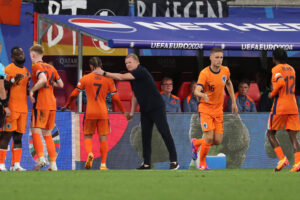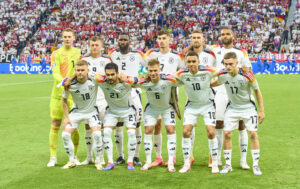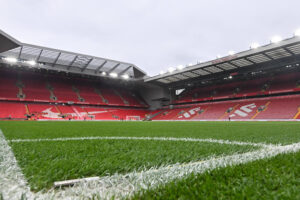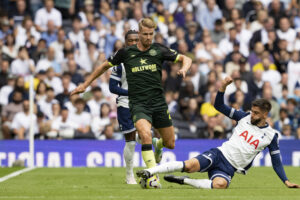In a year dominated by underdogs, Wales surpassed all expectation at Euro 2016. An incredible summer saw them reach the semi-final and just fall short to Portugal, the eventual winners.
Along the way, they topped Group B, squeaked past Northern Ireland and thrashed Belgium in Welsh Football’s greatest ever night. They stunned the continent; possibly the world. Now they’ve been noticed, and if they want to repeat this summer’s success, they’ll need to adapt.
New-found pressures to test Wales’ Golden Generation
From spare part to spotlight
The Welsh rise has been meteoric. Inspired by star player, Gareth Bale, Wales have climbed from 117th to 11th in the FIFA World Rankings in five years. Gary Speed got the ball rolling. An untimely passing, Speed left Wales ranked 45th after ending 2011 in fine form. His death stalled progress, but Chris Coleman eventually got things back on track. Four years on, they had qualified for their first tournament in over 50 years.
Despite the changes at managerial level, the team spirit was maintained, if not enhanced by the tragedy. The whole set-up was determined to do Speed proud. And they did. Often labelled a ‘one-man team’ due to Bale’s world class qualities, they were barely taken seriously outside the Welsh borders.
Spirit was only partially responsible for what was to come. Coleman’s tactical awareness ensured he got the best out of his limited resources. Setting up in a 3-4-2-1 formation for much of the Euro 2016 qualifying campaign, Wales were a tough nut to crack. They conceded just four times in ten games. Captain Ashley Williams orchestrated the backline, while Neil Taylor and Chris Gunter regularly chipped in at both ends of the pitch in wing-back roles.
Adding spark to the solidity of the Welsh structure were Bale and Aaron Ramsey operating between the midfield and attack in free roles. It was rare a goal would ever occur without significant contributions from either Ramsey or Bale. The latter scored seven of Wales’ 11 goals in qualifying. The former went on to assist four and score once during the tournament.
Once they graced the French football fields, momentum took them further than most of them could ever expect. Now, finding themselves in the spotlight, an even greater challenge awaits.
Proactivity might be required from Coleman
Wales were lauded for their discipline in maintaining their shape and their bravery in taking the game to their opponents. But the system that served them so well, will be under close scrutiny. Opposing managers will no longer take them for granted, if they ever did with players such as Bale and Ramsey involved.
The three-strong backline was efficient more often than not. But in their two losses at Euro 2016, the drawbacks were exposed. Wales didn’t once waver from the 3-4-2-1 formation, and it was to their detriment when facing a front two.
In the group stages of the tournament, England were facing an early plane home as they entered the second half vs Wales 1-0 down. Perhaps the only right call Ex-England Manager Roy Hodgson made all summer, was partnering Jamie Vardy and Daniel Sturridge up front for the second half. England eventually ran out 2-1 winners, both players getting on the scoresheet.
Against Russia, Northern Ireland and Belgium, Wales won three on the bounce as their opponents all pitted lone strikers up against their defence. The only goal they conceded in that run, a Radja Nainggolan thunderbolt from 25 yards.
It’s to be seen as to whether opposition managers will change their own preferred methods in order to stimulate a confident Welsh team, but Euro 2016 showed they’re vulnerabilities, as well as obvious qualities. A two-pronged attack pushes Wales closer to their own goal, and with an extra man to pick up between the three centre-backs. Additionally, a traditional 4-4-2, as played by Portugal and England, will see space behind Wales’ full-backs open to exploitation.
Moldova clash a chance for experimentation
While changing a winning formula is always a risk, Coleman has to consider Wales’ new-found reputation. Wholesale changes are of course not required. The system will remain effective. It is also one the players have down to a tee.
But their World Cup qualifying opponents will be doing their homework. And it’s up to Coleman to devise a solution for any obstacles that face them. Wales are undoubtedly at their best when teams open up against them. The space left in between their midfield and defence can then be exploited by Bale and Ramsey.
Their first test in this campaign comes against Moldova. A footballing minnow, ranked at 165th, they’ll sit deep, with ten men behind the ball.
Wales will also have to do without their creative spark, Ramsey, who is recovering from a hamstring injury. The Arsenal man missed out on the semi-final against Portugal too. That night Wales were lacklustre at best in the final third.
While it would be a huge shock for Wales not to find a way to break down Moldova without Ramsey, as a player susceptible to injuries, it’s a concern moving forward.
Monday night, against a team ranked 154 places below them, represents ample opportunity for Wales to test themselves with new strategies and new personnel, for they’ll face sterner challenges than this over the next two years.






